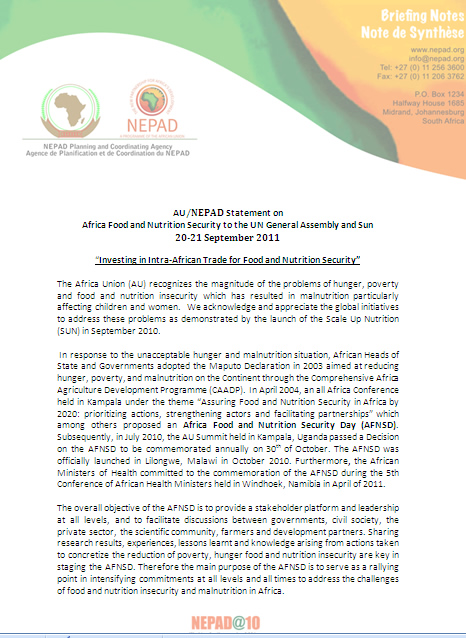New York, 3 October 2011 – As the New Partnership for Africa’s Development (NEPAD), the blueprint for the continent’s development, commemorates its tenth anniversary, United Nations and African officials gather in New York to reflect on its achievements and debate its future course.
A series of high-level meetings and events designed to foster debates and generate suggestions for further improvements are slated to take place from 6 to 12 October in New York, both at the UN headquarters and elsewhere in the city. “All these are opportunities for us to look back at the role of NEPAD and the remarkable progress Africa has made over the past ten years,” said UN Under Secretary-General and Special Adviser for Africa, Mr. Cheikh Sidi Diarra.
The events will kick off on 7 October with a panel discussion at the UN, which will ponder the links between NEPAD and the Millennium Development Goals (MDGs). Other events include briefings to UN member states, a commemorative public lecture at Columbia University, and press briefings by Ibrahim Assane Mayaki, the Chief Executive Officer of the NEPAD Planning and Coordinating Agency (NPCA), and other officials.
Shortly after its adoption by African leader ten years ago, the NEPAD plan became the main UN vehicle in support of Africa. Over the past decade, NEPAD has promoted bold and innovative approaches in various sectors, including agriculture, new technologies and governance. “Our initiatives are progressively bearing fruits on the grounds and we expect the plan’s impact to be stronger in coming years,” affirms Mr. Mayaki. “Already, it has changed the perception people have of Africa,” he adds.
In February 2010, NEPAD was officially incorporated into the African Union (AU) formal structures with the creation of the NPCA.
For Africa as a whole, the past ten years have been marked by significant progress: economic growth accelerated during most of the decade across the continent and democratically elected regimes became more common. Yet, endemic poverty and high unemployment rates persist. “Meeting here, 10 years after the plan was adopted, is also an opportunity to take a closer look at the challenges that remains for NEPAD and for the continent,” concludes Mr. Diarra.
For more information, please contact
UN-DPI: André-Michel Essoungou, essoungou@un.org, 1-917-367-9995
UN-OSAA: François Charlier, charlier@un.org, 1-212-963-0359
NEPAD Agency: Andrew Kanyegirire, andrewk@nepad.org, +27 83 704 4506
Visit UN/NEPAD@10 website at http://www.nepad.org/ and http://www.un.org/africarenewal

